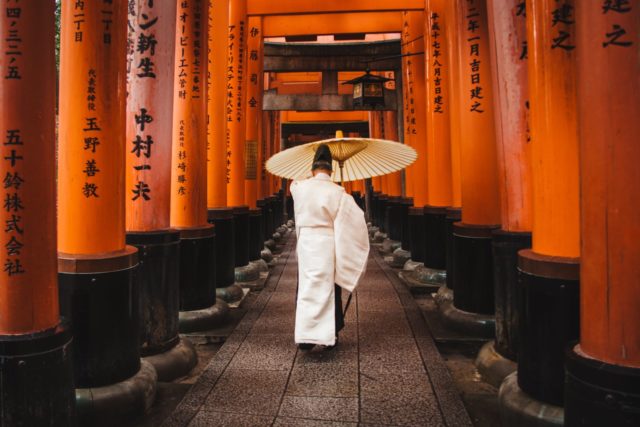
Fushimi Inari Shrine, Japan by Pexels
One of Japan’s most cherished celebrations, Golden Week spans April 29 – May 5th. This week is a special time when the entire country celebrates cultural traditions by observing four historical holidays. Companies close their doors and employees enjoy a week of paid vacation. Global business takes a pause to celebrate each of the four festivals of important significance to the people of Japan.
The week received its name when in 1951, ticket sales for the film Jiyū Gakkō rose more than they had during any other time of the year. The film director then nicknamed these holidays as “Golden Week” to further advertise it as the ’golden’ time to go to the movies. In honor of this festive time on the Japanese calendar, we’re sharing the history and traditions of the four official holidays.
- Showa Day- April 29:
Showa Day commemorates and honors Emperor Showa who served as emperor in the periods before and after World War II. Citizens are encouraged to reflect on Japan’s struggle during Emperor Showa’s rule and remember those lost in World War II. This date is considered a contemplative day, dedicated to reflection and acknowledging Japanese history. Citizens tend to remain home, and shops and public offices show respect by staying closed for this date.
- Constitution Day- May 2:
Constitution Day starts the lively side of Golden Week as it celebrates the signing of the Japanese Constitution on May 3, 1947. A year after the signing, Japan’s government declared that the anniversary would serve as a national holiday. To celebrate, citizens attend lectures on the constitution and learn about the overall impact it has made on Japanese society.
- Greenery Day- May 4:
Greenery Day, also known as Midori no Hi, was once celebrated on April 29, but in 2007 was moved to May 4 as a day devoted to the environment and nature. The holiday, known by some as merely an extension of Golden Week, is also a tribute to the Emperor Showa, who was known for his love of nature. On this day the people of Japan are encouraged to take time to enjoy the outdoors, reflect and appreciate the beauty of Mother Nature.
- Children’s Day- May 5:
Arguably the most photographic day of this celebratory time, Children’s Day ends Golden week with candy, carp kites and lots of family fun as the people celebrate the youthful happiness of the children of Japan. Although the holiday was originally exclusively for boys, more modern celebrations include girls. The holiday’s most recognizable symbol, the carp fish, represents a Chinese legend in which carp swim upstream and transform into dragons, a symbol of the journey for a child’s journey of maturity and growth into adulthood.
This lively season in Japanese culture is a time of reflection, family, and springtime fun. Whether you’re celebrating Children’s Day in Osaka or observing Midori no Hi in your backyard be sure to enjoy this special time of the year and wish everyone a happy Golden Week!
Sharon Schweitzer and A.Hannah Alvarado co-wrote this post. Sharon Schweitzer, J.D., is a cross-cultural trainer, attorney, modern manners expert, and the founder of Access to Culture. In addition to her accreditation in intercultural management from the HOFSTEDE Centre and the Intercultural Communication Institute, she serves as a Chinese Ceremonial Dining Etiquette Specialist in the documentary series Confucius was a Foodie, on Nat Geo People. She is the resident etiquette expert on two popular lifestyle shows: ABC Tampa Bay’s Morning Blend and CBS Austin’s We Are Austin. She is regularly quoted by BBC Capital, Investor’s Business Daily, and Fortune. Her Amazon #1 Best Selling book in International Business, Access to Asia: Your Multicultural Business Guide (Wiley 2015), now in its third printing, was named to Kirkus Reviews’ Best Books of 2015. She’s a winner of the British Airways International Trade Award at the 2016 Greater Austin Business Awards and the 2017 New York City Big Book Award for Multicultural Nonfiction.
Continuing her higher education at Texas State University, A.Hannah is set to receive her Bachelor’s Degree in English, in 2019. She is a native Texan with a background in writing, sales, social media marketing, and customer service. Hannah aspires to perfect her passion for writing in the hopes of becoming a novelist. With all the fantastic opportunities offered at Access to Culture, she is excited to be a new member of the team. Connect with her at Hannah Alvarado.

Leave A Comment